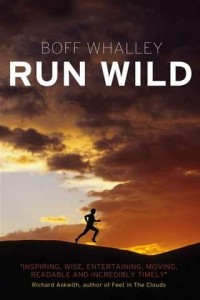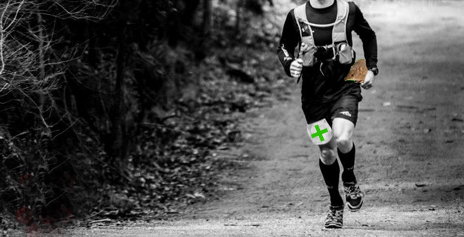Run Wild
Run Wild is the story of a musician whose work you’ll know and his love of off road running.
Boff Whalley is angry. Tub-thumping mad as it turns out. The musician, fell and trail runner, and sometime philosopher is not happy with the modern big-city big-business marathon. Whalley likes to run wild and his book outlines how his preferred terrain (going straight up and down the hills of northern England) is an expression of running that has no relation to the suffering driven world of the marathon finisher.
Lest you think Whalley is a bitter critic he points out, regularly, that he has in fact run a marathon. It was his first running experience and ended his relationship with the sport until five ye ars later he watched a fell race and has not stopped running since. It is a sometimes difficult task for Whalley, who mixes his love of rugged running with playing guitar for Chumbawamba (until their break up last year), the band with the lyric that has helped every trail runner through a bad hour or two at some point; “I get knocked down, but I get up again.” Since watching that fateful race Whalley has blended his constant touring schedule, late night parties and rock star lifestyle with a search for new trails and landscape to run across. He describes how the sport has transfixed him since and his enthusiasm, nay, love for the adventure of simply strapping on shoes and heading into nature is inspiring.
ars later he watched a fell race and has not stopped running since. It is a sometimes difficult task for Whalley, who mixes his love of rugged running with playing guitar for Chumbawamba (until their break up last year), the band with the lyric that has helped every trail runner through a bad hour or two at some point; “I get knocked down, but I get up again.” Since watching that fateful race Whalley has blended his constant touring schedule, late night parties and rock star lifestyle with a search for new trails and landscape to run across. He describes how the sport has transfixed him since and his enthusiasm, nay, love for the adventure of simply strapping on shoes and heading into nature is inspiring.
The book, Run Wild, tells the story of his affinity for running off-road as well as mixing in some philosophy, history of our sport and, did I mention this already, his hatred of the marathon. Whalley actually goes to watch the New York Marathon and is disgusted by the spectacle which he sees as a chaining of the human spirit and forcing of people into strict patterns of pounding concrete and the mantra of no pain no gain. It is not a book for someone bursting with joy at finishing 42.2kms of covering concrete for Whalley’s determined dismantling of the city marathon will burst any bubble of pride.
In opposition to this, Whalley presents the freedom and liberation of running wild, free of maps and plans and treating each run as an adventure and a chance to explore. His descriptions of runs through the English countryside and various races (including the Bob Graham Round which involves running to the peaks of 42 fells in under 24 hours) focus on the joy of running, its simple pure expression of being alive. Given Whalley’s history as an anarchist who seeks to undermine the establishment through creativity his stance on the heavily corporatised and glamourised marathon is not surprising and the simple, unorganized, undisciplined feat of going for a trail or fell run takes on broader connotations. Not for Whalley is running about suffering, goal setting and improving PBs but an exploration of both the internal and external. His main gripe with running on closed roads is that it “dislocates us from the earth we are running on.”
Run Wild, with its lack of narrative and collection of musings, anecdotes and, oh yeah, diatribes against city marathons, is a rewarding book. If you can handle the feeling of being preached to by a man who hopes to “act without being told what to do and without telling others what to do” there is much to be celebrated. Whalley loves to run and experience it in the wild. His joy and enthusiasm for running trails all over the world oozes off the pages and into your own legs.
By Garry Dagg, minimalist/barefoot editor and fellow student of Whalley’s anti-concrete manifesto for running.






